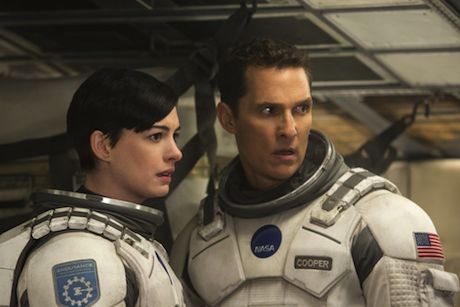Why Interstellar Is Complete Bollocks
It's hoovering up 5 star reviews and will probably make gangbusters, but here's why we think Interstellar is absolute pony...

This review contains minor to mid level spoilers for Interstellar. You have been warned.
Interstellar is a bad film. It’s a bad film currently hoovering up five star reviews from the mainstream press. It’s a bad film that will most likely do gangbusters as audiences flock to it in droves to enjoy the 3rd act in the “McConaissance Era.” It’s a bad film that’s packaged some of the lowest, most often copied forms of its genre and is going to impress unsuspecting audiences who haven’t seen its more impressive forefathers.
To make a glib and poorly put together pop culture tangent, Interstellar is the Steven Fry/Russell Brand of science fiction blockbusters. It’s what a stupid person thinks a clever film looks like.
Reining in my hyperbolic vitriol, Interstellar is a three hour testament to everything that works, and consequently fails about Christopher Nolan’s approach to filmmaking, so to unpack what makes Interstellar the thing it is, you’ve got to unpack Nolan’s shtick.
Christopher Nolan is a very precise filmmaker, who uses a very particular set of tools to create visually bombastic films. He opts for big thematic ideas over human characterisation to get his stories across. A large part of the recent Nolan backlash comes from him unintentionally kick starting Hollywood’s current penchant for reboots, equating “gritty” with good storytelling, and Hans Zimmer film scores. (One day we’ll have to explain to a generation why so many films sound just a fraction off the colon troubling “brown note”) Critics of Nolan often cite his rinse-repeat style to his films. They say he shuns women and minority characters to make films where your white male protagonist with family dysfunction, will be joined by his mentor (normally played by Michael Caine), for a quest that will somehow involve a shy brunette love interest/femme fatale/sometimes both. Ho Hum.
As (partially) true as this is, to his credit Nolan has created a number of very impressive, distinct works of fiction using the same tools. Say what you may about them but The Prestige, Inception and The Dark Knight Trilogy are all absorbing films, each with their own distinct styles, yet all built from similar parts. If Nolan is a painter who uses the five or six colours again and again and again, he’s bloody good at getting them to make different pieces of art.
The problem with Christopher Nolan’s approach to filmmaking and Interstellar by extension, lies with his inability (read: failure) to grasp the need for humour and subtext in storytelling.
You know which director has a particularly good grasp of both?
Steven Spielberg.
You know which director Interstellar was originally written for before they had to jump ship?
Steven Spielberg.
More…
For its first hour, Interstellar positively soars. Shot in 70mm film on a soundstage rather than in front of green screen, Interstellar is a gorgeous film that goes about building its world in a confident and robust manner. In short, it’s sometime in the near future and mankind is starving, a blight has hit the crop supply leaving agriculture the most important job around and dust bowls a frequent and ever increasing danger to whatever population is left. McConaughey plays Cooper, former astronaut and engineer who is eventually sent off outside our galaxy to find new habitable world for the human race. Eventually.
For the first hour or so, Interstellar does that wonderful thing Spielberg’s Close Encounters of the Third Kind did. It takes it time. McConaughey does an effective job as a brash roguish dreamer, shooting the shit with family, loving his children but ultimately frustrated with the knowledge that he’s amongst the last to live on Earth. Michael Caine admirable in his role as “Michael Caine in a Christopher Nolan film”, acting as a mentor/exposition device, sprinkling in Dylan Thomas’ poem “Do Not Go Gentle Into That Good Night.” Robot assistant TARS pops up looking like a LEGO brick with Swiss army knife usefulness and Siri’s pithy sense of humour. By the time we first reach our alien planet, clever (in the narrative sense) shenanigans ensue, causing the plan to go awry and the stakes to ramp up in a time travel bit that sees McConaughey sell a particular moving scene as Jessica Chastian’s role is revealed.
And then Interstellar totally screws the pooch.
Looking at a Nolan film that did work, one reason The Dark Knight is in everyone’s DVD collection because Nolan used the same thematic question of “How far are you willing to go to protect the thing you love?” into a number of conflicts. Bruce wrestles with how to make Rachael love him, Alfred is concerned for the life of Bruce and so forth. All of the interpersonal relationships build in such a way that when a man dressed as a bat talks to Harvey Dent and Commissioner Gordan about what to do about a psychopathic man dressed as a clown threatens their city, it doesn’t feel out of place. All of the small stuff asked the same question, so when the big stuff happens, it feels tonally right and important. Interstellar fails to do that because once it gets past the hour point, its key thematic question gets butchered, maimed and shunted about the place to facilitate wherever the story needs to go next.
Bit by bit, bizarre character motivations are revealed in increasingly awkward, clumsy and tone deaf ways. Anne Hathaway devolves from an intelligent, strong female character to a simpering survival novice, driven by the most base of instincts. McConaughey’s Texas charm instead becomes a tool for which the “We don’t have time for science! Speak layman English while I act headstrong!” storytelling trope is invoked. As we delve deeper into the rabbit hole, the story yearns to be something deep, complicated and meaningful, but robs far too many conceits from 2001: A Space Odyssey and episodes of Doctor Who to be anything but lazy to the newbie, and downright insulting to a seasoned science fiction fan. The later half of Interstellar feels so cheap, manipulative and careless in its storytelling that it veers into unintentionally hilarious as a sudden cameo turns up in what feels like an effort to inject punchy action into a story that did not need any. A smug, self-congratulatory denouement only exacerbates things, as the film pats itself on the back for its grand reveal. They even use time travel to accelerate the ageing of the black scientist so he could fulfil the position of “Magical Negro”.
Interstellar is an immensely frustrating film because it could have been as good as it thinks it is. There are a number of scenes where you get the impression that, with Spielberg behind the camera, Interstellar could have made good on its ambitious opening hour. For Interstellar is a Spielberg story. One of the most remarkable things about Spielberg’s storytelling style is even though his hallmarks are so readily identifiable, he is incredibly difficult to copy. JJ Abrams had a go with the fatherhood and alien stuff in Super 8, Gareth Edwards kind of got the right idea by with holding Godzilla right until the very end of the new film, but what truly stands Spielberg out is how much work he puts into selling relationships in his films. Why E.T. and Elliot care about each other is never spelled out for you, it doesn’t have to be, because Spielberg gave us the Reeces Pieces, he gave us the bike ride. Spielberg gets the fundamental rule of storytelling; “show don’t tell.”
Interstellar falls flat because it ends up mistaking form for function. When it chooses to show, it instead shines a light on far away worlds and a blighted Earth, rather than working hard to make us care for the people in them. Science fiction is one of cinema’s most awe-inspiring and powerful genres, allowing storytellers to reflect on the human nature by way of different worlds and high concepts. Think District 9’s used aliens as an apartheid allegory, Interstellar uses sci-fi conventions as easy storytelling crutches. Interstellar needed to work by focusing on the small reasons that motivate mankind to look to the stars. Instead it flounders with spinning spaceships.
Someone once pointed out to me that Christopher Nolan’s films make life incredibly hard for themselves due to their humourless nature. In removing humour from his films ,Nolan gives himself an incredibly small amount of breathing room for his stories to work – it takes only the slightest deviation for a story to go from serious, mature and involving to complete hokum. Interstellar veers too far, too often . History will most likely be kind to Interstellar. It’s eventual legacy will resemble how I think Nolan will be thought of in years to come. Revered by the traditional film fans, but seen as problematic, bloated and divisive by others.
Enjoy, comment, share and criticise. And if you want to be meaner than the comments will allow, Carl Anka can be found tweeting @Ankaman616
If you like it, Pass it on
 COMMENTS
COMMENTS
No comments yet, be the first!


 RELATED
RELATED


 SABOTAGE
SABOTAGE





